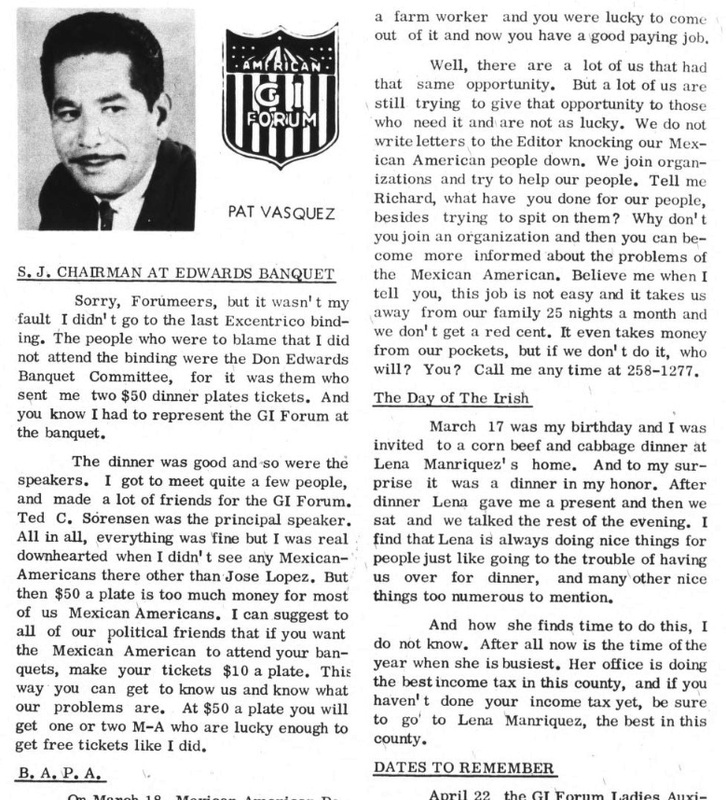-
Title
-
Pre-1960 National Mexican American Advocacy Groups Continue in the 1960s and 1970s
-
Description
-
League of United Latin American Citizens (LULAC)
The first nationally recognized ethnic Mexican advocacy group in the United States, LULAC incorporated naturalization and voter registration as key elements in their organizing. Established in 1929, LULAC leadership advocated for community rights and an end to discrimination suffered by Latin American citizens in the United States. LULAC is the oldest Hispanic civil rights organization in the U.S., with a large middle-class membership and focus on the rights of citizens, and is considered more conservative in their tactical approach. In the 1960s LULAC supported national and local candidates and mobilized Mexican American voters and candidates for political office.
Community Service Organization (CSO)
Founded in 1947 as a national organization to protect the civil rights of Mexican Americans and encourage political and civic engagement, the CSO was formed primarily by community organizers. Although it was a national organization, individual chapters played a critical role in developing local and state policies that impacted the labor and voting rights of Mexican Americans. The local San José CSO chapter (according to La Raza Historical Society of Santa Clara Valley) worked from 1955 to 1961 “to change statewide labor laws to enable Non-citizen Old Age Pensions in California.'' After César Chávez, Gilbert Padilla, and Dolores Huerta left the CSO in 1961 to form the United Farm Workers of America (UFWA), Lino Covarrubias and other San José leaders helped workers actually receive these benefits.
During the 1960s and 1970s, three voting rights bills would prove critical to LULAC and CSO activities. The Voting Rights Acts of 1965 outlawed discriminatory voting practices adopted after the Civil War, including literacy tests as a prerequisite to voting. The Voting Rights Act Amendment of 1970 lowered the voting age in national elections to 18. This encouraged young people to engage in political activity. All of these bills would foster the creation of more politically focused advocacy groups. Finally, the Voting Rights Act of 1975 provided assistance for “language minority” citizens, offering bilingual ballots and voting instructions, and assistance for blind, disabled, or illiterate voters.
American GI Forum
The American GI Forum (AGIF) had been established after WWII by returning ethnic Mexican veterans who faced discrimination when attempting to join established groups, such the Veterans of Foreign Wars, with largely white membership. AGIF became strong advocates for Mexican American/Latino veterans with the slogan "Education is our freedom, and freedom should be everybody's business." In contrast to other Mexican American/Latino groups created prior to WWII, such as LULAC, the GI Forum took political positions in opposition to the American political establishment. The AGIF leadership campaigned against the Bracero program, supported legal challenges to school segregation, and marched in solidarity with Chicano protesters. Between 1969 and 1979, the AGIF led a national boycott against the Adolph Coors Company, challenging the corporation's discriminatory employment practices. AGIF also sponsored Mexican cultural events and commemorations such as Cinco de Mayo and 16 de Septiembre in San José, the largest such events in California.
The San José Chapter of the AGIF was established June 6, 1949, by ethnic Mexican veterans of WWII. In the 1950s, veterans from the Korean Conflict joined the chapter. According to the Santa Clara County La Raza Historical Society, this chapter focused on bringing in community members to serve as counselors at the Santa Clara County William James Boys Juvenile Detention Ranch. By the 1960s, the San José Chapter and the newly formed Santa Clara Chapter (1961), with the associated Ladies Auxiliaries of the AGIF, joined together to sponsor community activities such as parades, fiestas, dances, queen competitions, and fashion shows, to raise scholarship money for ethnic Mexican students. In addition they held an annual Black and White Ball fundraiser at the Cabana Hyatt House in Palo Alto, raising millions of dollars for their cause.
-
Identifier
-
B4SV Exhibit Topic Six: Slide 001


